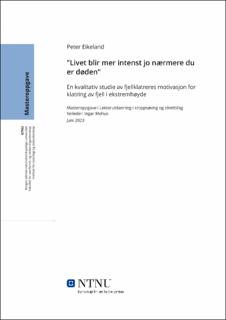Livet blir mer intenst jo nærmere du er døden
Abstract
Denne mastergradsavhandlingen undersøker fjellklatreres motivasjon for å klatre fjell i ekstremhøyde – en svært risikofylt aktivitet som i liten grad er forsket på tidligere. Selv om risikoen og konsekvensene ved aktiviteten er velkommunisert, drar klatrere likevel hvert år til 7- og 8,000-meterstopper i Himalaya for å forsøke å bestige dem. For å øke kunnskapen rundt motivasjonen til disse fjellklatrerne vil denne studien ta sikte på å belyse følgende problemstilling: Hvordan er tilfredsstillelsen av fjellklatreres grunnleggende psykologiske behov og deres selvbestemte motivasjon ved klatring i ekstremhøyde? Basic Psychological Needs Theory og Organismic Integration Theory, to underteorier av Deci og Ryan (1985) sin Self-Determination Theory, benyttes som motivasjonsteoretisk rammeverk.
For å skaffe en inngående forståelse i temaet, ble det gjennomført semistrukturerte dybdeintervju med fire norske fjellklatrere med bred klatreerfaring fra både 7- og 8,000-meterstopper i Himalaya. Datamaterialet ble i etterkant analysert i lys av en temasentrert tilnærming.
Funnene fra studien tyder på at informantene i stor grad får tilfredsstilt sine grunnleggende psykologiske behov, selv om tilfredsstillelsen er situasjonsbasert og varierer noe. Informantene opplever jevnt over en følelse av å ha ferdigheter og egenskaper til å mestre fjellets risikable utfordringer, i tråd med behovet for kompetanse. De kjenner også på trygghet og godt sosialt samvær i klatreteamene på ekspedisjoner, i tråd med behovet for tilhørighet. De opplever videre å ta selvbestemte valg av fjell og utfordringer, i tillegg til å få være delaktig i valgtakingsprosesser i klatreteam underveis på ekspedisjoner, i tråd med behovet for autonomi. En slik tilfredstillelse av behovene vil gi et godt grunnlag for å oppleve velvære og autonom motivasjon. Resultatene antyder også at informantene i stor grad opplever motivasjon som stammer fra indre motivasjon og autonome motivasjonsreguleringer, og i mindre grad kontrollert motivasjon og amotivasjon. I enkelte situasjoner hvor ett eller flere av de grunnleggende behovene frustreres, kan imidlertid amotivasjon fremtre. This master's thesis examines the motivation of mountaineers to climb mountains at extreme altitudes – a highly risky activity that is relatively under-researched. Despite the well-communicated risks and consequences associated with this activity, climbers travel every year to the 7- and 8,000-meter peaks in the Himalayas, in an attempt of summiting the mountains. To increase the knowledge concerning the motivation of these mountaineers, this study aims to address the following question: How is the satisfaction of mountaineers' basic psychological needs and their self-determined motivation in relation to climbing in extreme altitudes? Basic Psychological Needs Theory and Organismic Integration Theory, two sub-theories of Deci and Ryan's (1985) Self-Determination Theory, are utilized as a theoretical framework.
To gain a comprehensive understanding of the topic, semi-structured in-depth interviews were conducted with four Norwegian mountaineers with extensive climbing experience on both 7- and 8,000-meter peaks in the Himalayas. The interview data was subsequently analyzed using a thematic approach.
The findings of the study suggest that the informants in most cases have their basic psychological needs satisfied, although satisfaction is context-dependent and varies to some extent. Overall, the informants experience the sense of having the skills and qualities required to overcome the risky challenges of the mountains, in line with the need for competence. They also experience the feeling of safety and positive social interaction within the climbing teams during the expeditions, in line with the need for relatedness. Furthermore, they report making self-determined choices regarding what mountain they want to climb, and which challenges they want to engage in. They also rapport being involved in decision-making processes within the climbing teams during expeditions, supporting the need for autonomy. Such satisfaction of the basic psychological needs provides a solid foundation for experiencing well-being and autonomous motivation. The results also suggest that the informants primarily experience intrinsic motivation, and motivation originating from autonomous regulations, and to a lesser extent, controlled motivation and amotivation. However, in certain situations where one or more of the basic needs are frustrated, amotivation may emerge.
